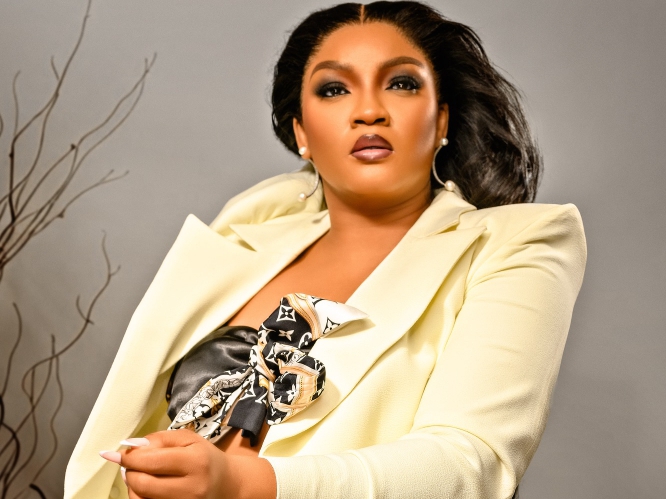Victoria Inyama claims ex-husband abused her… here’s how to handle abusive marriage

Nollywood star Victoria Inyama has bared the shocking truths of her previous marriage, shedding light on the distressing behavior of her ex-husband, Godwin Okrim.
In a revealing conversation with Chude Jideonwo, Inyama courageously recounted the unsettling moments when her former spouse would bring his lover into their home, blurring the lines of fidelity.
In a heartrending reveal, Inyama shared instances where her ex-husband would even go as far as allowing his girlfriend to dictate the household’s menu. “There was even one instance where the girl was telling me what to cook. I should not be cooking meat; I should be cooking fish. Fish is healthier. I was just looking at this girl, and they were ‘working together,’” she recounted.
However, the harrowing experiences did not end there. Inyama disclosed the profound emotional and physical turmoil she endured, detailing the harrowing abuse she faced.
Recalling the first instance of her husband’s violence, she expressed shock and disbelief, laying bare the deep scars left by the ordeal.
Despite the trials she faced, Inyama affirmed that she doesn’t lament sacrificing her career for her marriage, cherishing the blessing of her three beloved children. Her unwavering strength and determination shine through as she perseveres through the aftermath of the hardship she faced.
“I don’t regret abandoning my career for my marriage because I have three beautiful children,” said Inyama, highlighting the sacrifices she made for her family. Despite the challenges, she remains resilient and determined.
“My ex-husband was physically, socially, mentally, and psychologically abusing me. When my husband hit me for the first time, I didn’t believe it, I was in shock.”
10 Ways Women can Overcome Physical, Psychological, and Mental Abuse in Marriage
Seek professional help: It’s important for women facing abuse in marriage to seek help from professionals such as therapists, counselors, or support groups. These individuals can provide guidance and support to help women navigate the challenges they are facing.
Build a support network: Creating a support network of trusted friends, family members, or support groups can provide women with emotional support and a sense of community. Surrounding oneself with individuals who can offer encouragement and understanding is crucial in overcoming abuse.
Educate yourself about abuse: Understanding the dynamics of abuse, its different forms, and its impact can empower women to recognize the signs of abuse and take steps to address the situation effectively. Educating oneself about rights and options is an important part of overcoming abuse.
Develop a safety plan: It’s important for women to develop a safety plan that includes strategies for protecting themselves and their children from harm. This may involve identifying safe spaces, establishing a code word for help, and having important contacts readily available.
Seek legal assistance: Consulting with legal professionals who specialize in domestic abuse can provide women with valuable information about their rights and legal options. Legal assistance can be instrumental in securing protection orders or obtaining legal recourse.
Focus on self-care: Engaging in self-care activities such as exercise, meditation, hobbies, and spending time with supportive individuals can help women prioritize their well-being and mental health during challenging times.
Financial independence: Working towards financial independence can provide women with the means to leave abusive situations and build a secure future for themselves and their children. This may involve seeking employment, pursuing education, or accessing financial resources.
Set boundaries: Establishing clear boundaries with the abuser and asserting one’s rights can help women regain a sense of control and self-empowerment in their relationships.
Explore alternative living arrangements: In some cases, seeking alternative living arrangements, such as staying with supportive family or friends, accessing shelters, or exploring transitional housing options, can provide women with a safe environment to rebuild their lives.
Develop a long-term plan: Creating a long-term plan for independence and well-being is essential for women looking to overcome abuse. This may involve setting goals, accessing resources, and working towards a future free from abuse.
READ ALSO: How to deal with an abusive relationship
It’s important to note that addressing abuse in marriage can be complex, and individual circumstances may vary. Seeking personalized support from professionals and trusted individuals can provide women with the guidance and assistance they need to overcome abuse and build a safe, fulfilling life.




